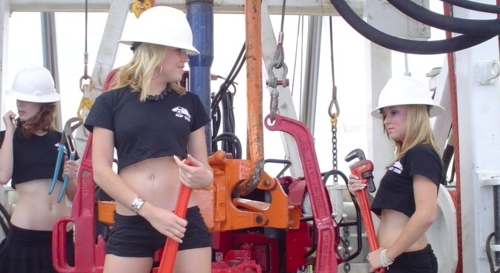Was The World’s ‘Northern-Most Island’ Erased From Charts?
by Kevin Hamilton (University of Hawaii) In 2021, an expedition off the icy northern Greenland coast spotted what appeared to be a previously uncharted island. It was small and gravelly,...


Have you ever really considered why your workplace is lacking in some areas? Or why, for example, individuals sometimes act unsafe even when they know the rules?
It’s easy to blame these issues on the managers in town, or the Captain, or the OIM, because they are in charge of that (supposedly) perfectly oiled machine of a company you work for.
So clearly it must be them. Right?
Not necessarily.
All companies have issues and the Fleet Superintendent is not responsible for your job satisfaction. It comes down to individuals being empowered to exercise personal initiative and leadership. What are YOU doing to promote a safe-work culture? What are YOU doing to promote personal initiative in your workplace? What are YOU doing to improve the systems and procedures within your company?
One of the issues I saw when I worked offshore was that junior personnel were typically not encouraged to lead discussions at pre-tour meetings, yet as soon as they were promoted into a leadership position, it was assumed their new positional authority would translate directly to their ability to speak effectively in front of groups.
This was obviously not the case, and a culture of partially effective leadership was just the way it was in the offshore industry.
“That’s crap,” I thought. And I’m going to figure out how to change it.
Being the new guy from New England, I figured I’d take a little risk and say a few things at each tour meeting that didn’t necessarily have anything to do with current operations, yet were in line with promoting leadership and teamwork.
I was standing on my soap box for a minute or two, and a few of the guys probably thought I was ridiculous, but everyone in that room appreciated the fact that I had the gumption to get up in front of a bunch of “country boys” and deliver a positive message before they started their day.
This process has since evolved to the point where junior personnel are the ones who now lead most pre-tour meetings and all associated training on board my former rig.
The vital behavior of promoting public speaking was the behavior I identified, and it was positively reinforced to the point where individuals in the crowd realized 1) they had the ability to get up there and speak, and 2) they had reasonable expectation that it would be positively reinforced by their peers.
Ability, and the question,“is it in my best interest?”, are the two reasons why people do anything in this world.
We are certainly capable of accomplishing almost anything we put our minds to, NASA is a good example of that. In many cases however, we decide that inaction is a more favorable decision than taking that first risky step out of the “box”. We view in our minds that the chance of someone negatively reinforcing our initiative is much greater than the chance of receiving praise for it. And rightly-so considering the fact that most people are more comfortable pointing out errors than giving someone a pat on the back.
Effecting change however is rarely something that an individual can do on his or her own. It’s also a matter of selling the idea to the social leaders within the group. For example, A Roustabout on a drilling rig is not going to change the way the rest of the guys in his crew work anything unless he’s able to sell the idea to the senior Roustabout, and subsequently the Crane Operator. The senior Roustabout provides the social backing required in order to get buy-in from the rest of the deck crew.
Finally, the identify the programs or method currently in place that support, or prevent, initiative in the workplace. Besides financial rewards, are there other methods for rewarding your employees for a job well done. How many different types of rewards can you identify that people use in your workplace? Is positive reinforcement given in a timely manner? Are correct behaviors reinforced, or correct results?
I encourage you to find answers to these questions and try to identify the vital behaviors required to effect change in your workplace. Please comment in the forum if you would like to share success stories or failures.
For more insight into this topic, I recommend reading: Influencer: The Power to Change Anything, by Kerry Patterson, Joseph Grenny, David Maxfield, Ron McMillan, and Al Switzler.
Join the gCaptain Club for curated content, insider opinions, and vibrant community discussions.


Join the 105,983 members that receive our newsletter.
Have a news tip? Let us know.
Access exclusive insights, engage in vibrant discussions, and gain perspectives from our CEO.
Sign Up




Maritime and offshore news trusted by our 105,983 members delivered daily straight to your inbox.



Essential news coupled with the finest maritime content sourced from across the globe.
Sign Up